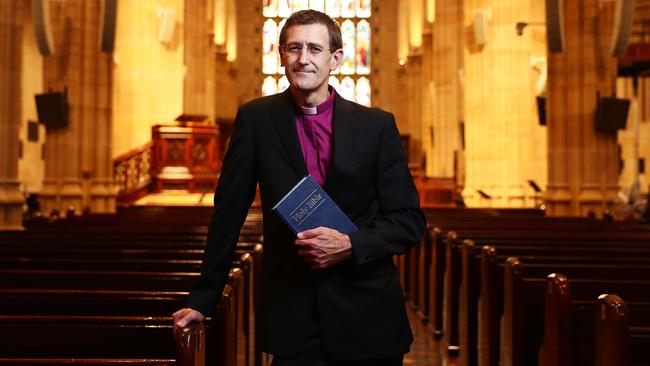Religious discrimination bill: church leaders want changes to draft legislation
Attorney-General faces pressure from leaders who felt they were left out of the consultation process for a new discrimination bill.

Religious leaders are set to advocate for a wave of changes to the draft Religious Freedoms laws announced by Attorney-General Christian Porter this morning, as many leaders who felt left out of the consultation process during the laws drafting express concern over elements in the legislations.
Their reaction comes after leaders from the Catholic Church and the Australian Christian boycotted Mr Porter’s speech at the Great Synagogue in Sydney today, over disappointment at the consultation process.
MORE: Gay marriage architects back religious bill
Michael Stead, Anglican bishop of South Sydney and Chair of the Religious Freedom Reference Group, told The Australian that he and Anglican Archbishop Glenn Davies had “very significant concerns” about the consultation process and the draft bill.
“I expect there will be minor tweaking around the edges and that there are probably little things that need to be improved.
“But I don’t expect that they will be substantive changes to the architecture of the bill. I think the Attorney-General has made it very clear that the overriding framework is not going to change.” Mr Stead said.
He also expressed concerns about Mr Porter’s flagging that the Australian Law Reform Commission recommendation process would be delayed despite the consultation for the religious freedoms exposure draft bill proceeding.
“What concerns me more is what’s not in the bill, and specifically, that the ALRC process is now going to be delayed so that its recommendations can’t be considered in parallel with this bill.
“It’s a very significant concern, because the ALRC is looking at the removal of religious exemptions from other anti discrimination acts.
“This is about religious discrimination, there is an obvious overlap between those two things. And the really thorny issues, as the Attorney-General indicated, are actually in that space of intersection.
“But we’re not allowed to talk about those two things together.
“Actually the real concern is not so much what’s in this bill, but the fact that it’s not going to be able to talk to the recommendations of the ALRC. And we may end up with something embedded in this bill that becomes unworkable.” Mr Stead said.
Mr Stead said he was also concerned at the lack of clarity of how the laws would impact workplaces and corporations who sacks employees for expressing religious views, and said the situation of Israel Folau and Rugby Australia had not been made any clearer by Mr Porter.
He also said he was not surprised by Catholic Church leaders boycotting this morning’s speech, and said “some of their concerns are well founded”.
Bilal Rauf, the spokesman who accompanied the Grand Mufti of Australia Dr Ibrahim Abu Mohammed to Mr Porter’s speech this morning, told The Australian he was disappointed at the consultation process leading up to today’s exposure draft release.
“It’s really now that the consultation process seems to be beginning. Prior to today, there has been very little discussion and there has been very little involvement with us.
“It’s more been a case of people pushing to try and get across views without really understanding what the government had in mind.
“Today is the first opportunity that we can get some real insight into what their thinking is. And I think leading up to now, you know, there hasn’t been that same level of discussion.”
He said he was concerned that given how developed the draft is, further significant change would be unlikely.
“It seems to be quite advanced in its form. I think the reality likely is that there will be little scope to achieve structural or significant changes.” Mr Rauf said.
Mr Rauf also noted the “positive rights” model that the Australian National Imams Council has put forward in a written submission ahead of the bills drafting was not reflected in the version released today.
“We were part of the group that were putting forward certain views as to the approach, namely, a positive right approach.
“We are hopeful that there will be fulsome consultation and the opportunity to engage and provide feedback… We hope to attend the next consultation phase.” he said
Peter Wertheim, Co-CEO of the Executive Council of Australian Jewry, told The Australian he was also concerned about the impact of the delay of the ALRC recommendations as the Religious Freedoms draft proceeds.
“I’m more concerned that the referral to the ALRC, concerning exceptions to the anti discrimination laws that benefit religious institutions, has now been narrowed somewhat, according to what the Attorney-General just announced.
“It will make it difficult given the fact that the timetable has now been extended out to next year, it will make it difficult to evaluate both exposure draft and any recommendations.” Mr Wertheim said.




To join the conversation, please log in. Don't have an account? Register
Join the conversation, you are commenting as Logout